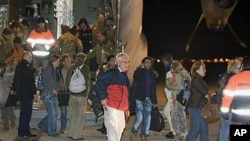As protest violence continued across Libya, European officials on Thursday debated how to handle a possible influx of migrants into Europe from the North African country.
Italian Interior Minister Roberto Maroni warned that Libya's political unrest could create a "catastrophic" humanitarian crisis.
Maroni told reporters in Brussels that the EU border agency Frontex estimates that as many as 1.5 million refugees could pour into Italy, a number, he says, would "bring any state to its knees."
The Italian interior minister pleaded for assistance from the European Union, but his counterparts showed little interest in sharing the potential burden posed by those fleeing the violence in Libya.
Austrian Interior Minister Maria Fekter said Italy should be able to manage, her country already is among the top recipients of asylum seekers in Europe. "Austria is a much smaller country than Italy. We think that the figure of 5,000 [refugees] is figure of persons Italy can handle alone," she said.
German Interior Minister Thomas de Maizière downplayed the situation, noting there has been no major influx of people fleeing Libya.
Italy did find support from Spanish Interior Minister Alfredo Perez Rubalcaba. "Italy is the door of Europe. And because of this, it its necessary for all of Europe. We don't know the amount of persons who could arrive in Europe. But in any case, we have to manage this problem because this is not the first time," he said.
The International Organization for Migration says nearly 6,000 Tunisians have arrived on the Italian island of Lampedusa in recent weeks. IOM spokeswoman Jemini Pandya says that at this point, no Libyans have arrived in Italy and she expects very few will.
"I don't think in any shape or form you are going to see one-and-a-half million migrants suddenly flood into Europe. That is really not going to happen at all. That would really be fearmongering to the extreme," Pendya said.
But Pandya says Italy alone should not shoulder the refugee burden.
Austria says it will reconsider its stance, if there is a major migration of people from Libya. But the Austrian and German foreign ministers noted that only 50 Tunisians have formally requested asylum since their country erupted in protests several weeks ago.
Germany's interior minister said Europe is not the answer for migrants seeking a better economic future. But Pandya of the International Organization for Migration says Tunisian migrants are leaving their country not only for work.
"We increasingly being told by the Tunisians, who are arriving in Lampedusa, that they are coming not only for economic reasons, but for family reunification. They simply just want to rejoin their families," Pandya said.
The EU recently launched a mission to help Italy cope with the influx of Tunisian migrants on Lampedusa.
Libya Unrest Sparks Migrant Debate in the EU




